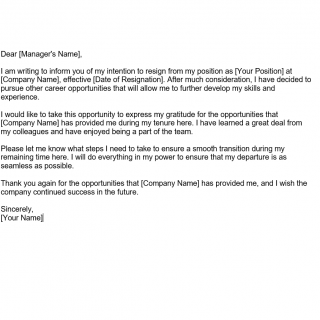Resignation Letter
A resignation letter is a formal document that an employee submits to their employer to notify them of their intention to resign from their position. It is an important document that serves as a record of the employee's decision to leave the company.
The resignation letter typically consists of several parts, including a header that includes the employee's name, address, and the date the letter was written. The body of the letter typically contains a brief statement that the employee is resigning from their position, along with the effective date of their resignation. The employee may also provide a brief explanation for their decision to resign, although this is not always necessary.
The most important fields in a resignation letter are the employee's name and the effective date of their resignation. These fields ensure that the letter is clear and unambiguous, and that the employer has a record of when the employee will be leaving the company.
A resignation letter is typically compiled when an employee decides to leave their position voluntarily. The parties to the document are the employee and the employer, and the document serves as a formal record of the employee's decision to resign.
When compiling a resignation letter, there are several features that should be considered. The letter should be clear, concise, and professional in tone. It should also be written in a respectful and courteous manner, even if the employee is leaving the company under difficult circumstances.
Resignation Letter Example
Dear [Manager's Name],
I am writing to inform you of my intention to resign from my position as [Your Position] at [Company Name], effective [Date of Resignation]. After much consideration, I have decided to pursue other career opportunities that will allow me to further develop my skills and experience.
I would like to take this opportunity to express my gratitude for the opportunities that [Company Name] has provided me during my tenure here. I have learned a great deal from my colleagues and have enjoyed being a part of the team.
Please let me know what steps I need to take to ensure a smooth transition during my remaining time here. I will do everything in my power to ensure that my departure is as seamless as possible.
Thank you again for the opportunities that [Company Name] has provided me, and I wish the company continued success in the future.
Sincerely,
[Your Name]
The advantages of a resignation letter are that it provides a clear record of the employee's decision to resign, and it helps to ensure that the employee leaves the company on good terms. By submitting a resignation letter, the employee can demonstrate their professionalism and respect for the company, which may be helpful in future job searches.
One potential problem when filling out a resignation letter is that the employee may not know how to write a professional letter or may not know what to include in the letter. To avoid this problem, there are many templates and examples available online that can help employees to create a clear and professional resignation letter.
Related forms to a resignation letter may include a severance agreement or release, which outlines the terms of the employee's departure and any severance pay or benefits they may be entitled to. Alternative forms may include an exit interview form, which allows the employer to gather feedback from departing employees on their experience with the company.
A resignation letter is typically submitted to the employee's immediate supervisor or to the human resources department. The employee should keep a copy of the letter for their records, and the employer will typically keep a copy in the employee's personnel file.

